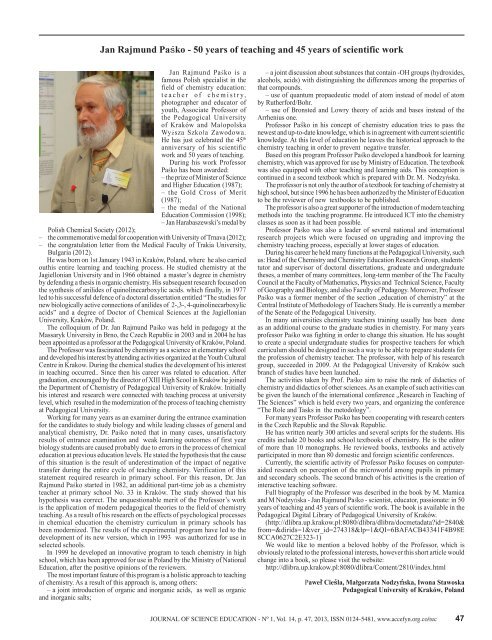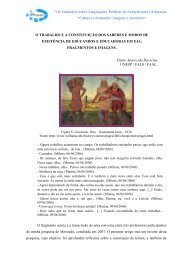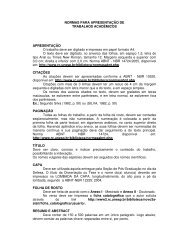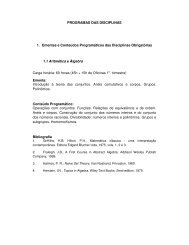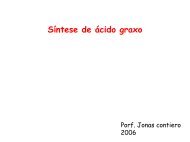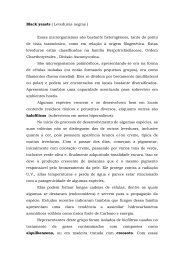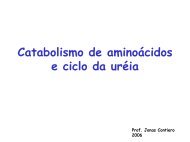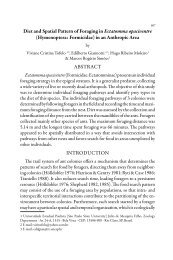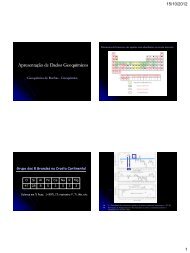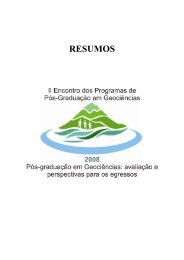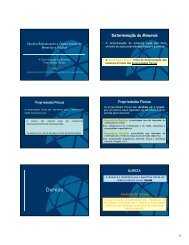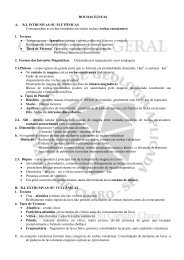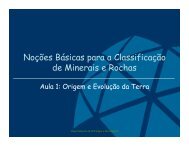Vol. 14 N° 1, 2013 - UNESP Rio Claro
Vol. 14 N° 1, 2013 - UNESP Rio Claro
Vol. 14 N° 1, 2013 - UNESP Rio Claro
Create successful ePaper yourself
Turn your PDF publications into a flip-book with our unique Google optimized e-Paper software.
Jan Rajmund Paśko - 50 years of teaching and 45 years of scientific work<br />
Jan Rajmund Paśko is a<br />
famous Polish specialist in the<br />
field of chemistry education:<br />
teacher of chemistry,<br />
photographer and educator of<br />
youth, Associate Professor of<br />
the Pedagogical University<br />
of Kraków and Małopolska<br />
Wyższa Szkoła Zawodowa.<br />
He has just celebrated the 45 th<br />
anniversary of his scientific<br />
work and 50 years of teaching.<br />
During his work Professor<br />
Paśko has been awarded:<br />
– the prize of Minister of Science<br />
and Higher Education (1987);<br />
– the Gold Cross of Merit<br />
(1987);<br />
– the medal of the National<br />
Education Commission (1998);<br />
– Jan Harabaszewski’s medal by<br />
Polish Chemical Society (2012);<br />
– the commemorative medal for cooperation with University of Trnava (2012);<br />
– the congratulation letter from the Medical Faculty of Trakia University,<br />
Bulgaria (2012).<br />
He was born on 1st January 1943 in Kraków, Poland, where he also carried<br />
outhis entire learning and teaching process. He studied chemistry at the<br />
Jagiellonian University and in 1966 obtained a master’s degree in chemistry<br />
by defending a thesis in organic chemistry. His subsequent research focused on<br />
the synthesis of anilides of quinolinecarboxylic acids. which finally, in 1977<br />
led to his successful defence of a doctoral dissertation entitled “The studies for<br />
new biologically active connections of anilides of 2-,3-, 4-quinolinecarboxylic<br />
acids” and a degree of Doctor of Chemical Sciences at the Jagiellonian<br />
University, Kraków, Poland.<br />
The colloquium of Dr. Jan Rajmund Paśko was held in pedagogy at the<br />
Massaryk University in Brno, the Czech Republic in 2003 and in 2004 he has<br />
been appointed as a professor at the Pedagogical University of Kraków, Poland.<br />
The Professor was fascinated by chemistry as a science in elementary school<br />
and developed his interest by attending activities organized at the Youth Cultural<br />
Centre in Krakow. During the chemical studies the development of his interest<br />
in teaching occurred.. Since then his career was related to education. After<br />
graduation, encouraged by the director of XIII High Scool in Kraków he joined<br />
the Department of Chemistry of Pedagogical University of Kraków. Initially<br />
his interest and research were connected with teaching process at university<br />
level, which resulted in the modernization of the process of teaching chemistry<br />
at Pedagogical University.<br />
Working for many years as an examiner during the entrance examination<br />
for the candidates to study biology and while leading classes of general and<br />
analytical chemistry, Dr. Paśko noted that in many cases, unsatisfactory<br />
results of entrance examination and weak learning outcomes of first year<br />
biology students are caused probably due to errors in the process of chemical<br />
education at previous education levels. He stated the hypothesis that the cause<br />
of this situation is the result of underestimation of the impact of negative<br />
transfer during the entire cycle of teaching chemistry. Verification of this<br />
statement required research in primary school. For this reason, Dr. Jan<br />
Rajmund Paśko started in 1982, an additional part-time job as a chemistry<br />
teacher at primary school No. 33 in Kraków. The study showed that his<br />
hypothesis was correct. The unquestionable merit of the Professor’s work<br />
is the application of modern pedagogical theories to the field of chemistry<br />
teaching. As a result of his research on the effects of psychological processes<br />
in chemical education the chemistry curriculum in primary schools has<br />
been modernized. The results of the experimental program have led to the<br />
development of its new version, which in 1993 was authorized for use in<br />
selected schools.<br />
In 1999 he developed an innovative program to teach chemistry in high<br />
school, which has been approved for use in Poland by the Ministry of National<br />
Education, after the positive opinions of the reviewers.<br />
The most important feature of this program is a holistic approach to teaching<br />
of chemistry. As a result of this approach is, among others:<br />
– a joint introduction of organic and inorganic acids, as well as organic<br />
and inorganic salts;<br />
– a joint discussion about substances that contain -OH groups (hydroxides,<br />
alcohols, acids) with distinguishing the differences among the properties of<br />
that compounds.<br />
– use of quantum propaedeutic model of atom instead of model of atom<br />
by Rutherford/Bohr.<br />
– use of Bronsted and Lowry theory of acids and bases instead of the<br />
Arrhenius one.<br />
Professor Paśko in his concept of chemistry education tries to pass the<br />
newest and up-to-date knowledge, which is in agreement with current scientific<br />
knowledge. At this level of education he leaves the historical approach to the<br />
chemistry teaching in order to prevent negative transfer.<br />
Based on this program Professor Paśko developed a handbook for learning<br />
chemistry, which was approved for use by Ministry of Education. The textbook<br />
was also equipped with other teaching and learning aids. This conception is<br />
continued in a second textbook which is prepared with Dr. M. Nodzyńska.<br />
The professor is not only the author of a textbook for teaching of chemistry at<br />
high school, but since 1996 he has been authorized by the Minister of Education<br />
to be the reviewer of new textbooks to be published.<br />
The professor is also a great supporter of the introduction of modern teaching<br />
methods into the teaching programme. He introduced ICT into the chemistry<br />
classes as soon as it had been possible.<br />
Professor Paśko was also a leader of several national and international<br />
research projects which were focused on upgrading and improving the<br />
chemistry teaching process, especially at lower stages of education.<br />
During his career he held many functions at the Pedagogical University, such<br />
us: Head of the Chemistry and Chemistry Education Research Group, students’<br />
tutor and supervisor of doctoral dissertations, graduate and undergraduate<br />
theses, a member of many committees, long-term member of the The Faculty<br />
Council at the Faculty of Mathematics, Physics and Technical Science, Faculty<br />
of Geography and Biology, and also Faculty of Pedagogy. Moreover, Professor<br />
Paśko was a former member of the section „education of chemistry” at the<br />
Central Institute of Methodology of Teachers Study. He is currently a member<br />
of the Senate of the Pedagogical University.<br />
In many universities chemistry teachers training usually has been done<br />
as an additional course to the graduate studies in chemistry. For many years<br />
professor Paśko was fighting in order to change this situation. He has sought<br />
to create a special undergraduate studies for prospective teachers for which<br />
curriculum should be designed in such a way to be able to prepare students for<br />
the profession of chemistry teacher. The professor, with help of his research<br />
group, succeeded in 2009. At the Pedagogical University of Kraków such<br />
branch of studies have been launched.<br />
The activities taken by Prof. Paśko aim to raise the rank of didactics of<br />
chemistry and didactics of other sciences. As an example of such activities can<br />
be given the launch of the international conference „Research in Teaching of<br />
The Sciences” which is held every two years, and organizing the conference<br />
“The Role and Tasks in the metodology”.<br />
For many years Professor Paśko has been cooperating with research centers<br />
in the Czech Republic and the Slovak Republic.<br />
He has written nearly 300 articles and several scripts for the students. His<br />
credits include 20 books and school textbooks of chemistry. He is the editor<br />
of more than 10 monographs. He reviewed books, textbooks and actively<br />
participated in more than 80 domestic and foreign scientific conferences.<br />
Currently, the scientific activity of Professor Paśko focuses on computeraided<br />
research on perception of the microworld among pupils in primary<br />
and secondary schools. The second branch of his activities is the creation of<br />
interactive teaching software.<br />
Full biography of the Professor was described in the book by M. Mamica<br />
and M Nodzyńska - Jan Rajmund Paśko - scientist, educator, passionate: in 50<br />
years of teaching and 45 years of scientific work. The book is available in the<br />
Pedagogical Digital Library of Pedagogical University of Kraków.<br />
(http://dlibra.up.krakow.pl:8080/dlibra/dlibra/docmetadata?id=2840&<br />
from=&dirids=1&ver_id=274318&lp=1&QI=6BAFACB43341F4B98E<br />
8CCA0627C2E323-1)<br />
We would like to mention a beloved hobby of the Professor, which is<br />
obviously related to the professional interests, however this short article would<br />
change into a book, so please visit the website:<br />
http://dlibra.up.krakow.pl:8080/dlibra/Content/2810/index.html<br />
Paweł Cieśla, Małgorzata Nodzyńska, Iwona Stawoska<br />
Pedagogical University of Kraków, Poland<br />
JOURNAL OF SCIENCE EDUCATION - Nº 1, <strong>Vol</strong>. <strong>14</strong>, p. 47, <strong>2013</strong>, ISSN 0124-5481, www.accefyn.org.co/rec<br />
47


